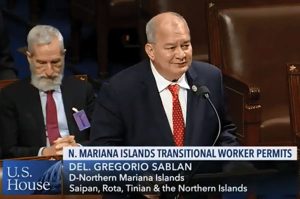CW bill glides thru House

Delegate Gregorio Kilili C. Sablan (Ind-MP) manages the U.S. Workforce Act during debate on the floor of the House of Representatives yesterday. The bill passed the House and now goes to the Senate, where virtually identical legislation has already been approved by unanimous consent. (Contributed Photo)
The U.S. House of Representatives unanimously passed early yesterday morning legislation that increases the Commonwealth’s foreign worker slots to 13,000 for fiscal year 2019 and extends the program’s slated sunset of December 2019.
“We are communicating now with Sen. Lisa Murkowski (R-AK) to hopefully get that [bill passed] as soon as possible,” said Gov. Ralph DLG Torres in a news briefing yesterday morning. “Knowing that the U.S. Senate has passed [the bill] earlier, I am very hopeful that…the U.S. Senate [will] move forward [with the bill] very expeditiously.”
The U.S. House passed U.S. Rep. Rob Bishop’s (R-UT) H.R. 5956 during a session in the nation’s capital. H.R. 5956 is co-sponsored by Delegate Gregorio Kilili C. Sablan (Ind-MP).
The bill is an identical version of a U.S. Senate bill that was deemed unconstitutional after the U.S. Senate amended it to include an anti-fraud fee, deemed a revenue-generating provision. Only the U.S. House may introduce legislation that contains revenue-generating properties, according to the U.S. Constitution. Murkowski championed the bill, which was S. 2325.
H.R. 5956 bumps up the number of slots for the foreign worker program, called CW-1, for fiscal year 2019 to 13,000; give longer CW permits for workers who have been continuously employed in the CNMI since 2015; and extend the program’s sunset provision to 2029.
Torres explained that while there are no specific priorities for securing CW slots per profession, he said the 13,000 cap should be sufficient for the denied permits of the Commonwealth Healthcare Corp., which reportedly only got one CW permit approved for the fiscal year.
“…Knowing the fact that we are at 9,998 now and opening [those slots] up, we are now able to accommodate the nurses and engineers,” he said. “We are a lot better than 9,998 and 4,999 this coming October. I think it is a number we can definitely live on.”
Torres urges those affected by the CW cap to “continue to remain patient” as the bill moves through U.S. Congress.
“We’ve fought for long-term status, and we will continue to do that. This [bill] I hope gives stability to families [because] when you have stability in our families, then our economy would have more stability as well,” he said.
In a statement, Sablan said that, without the bicameral and bipartisan working group, the bill would not have been able to get through Congress.
“By listening to each other, and because we share a common concern to better the lives of Americans—even Americans in the far-away Marianas—we succeeded in agreeing on this second bill, the U.S. Workforce Act,” he said.
“I believe my constituents’ needs are well-represented, because the legislation has the full support of the Marianas governor and Legislature, of the business community, and of the men and women who meet and talk with me in everyday life,” said Sablan.
‘Very very good news’
Rep. Angel A. Demapan (R-Saipan) said yesterday that, based on his conversations last week, the CNMI leadership was aware that the bill would garner unanimous consent. He did not specify whom he talked with about the bill.
“We are happy that [the bill’s unanimous passage] has finally happened, and we are grateful to the congressional offices that we were working with. We look forward to the U.S. Senate moving this swiftly,” he said, adding that the bill was just a U.S. House version of the previously introduced S. 2325.
Demapan remains confident that U.S. President Donald J. Trump would support the bill as well, based on “communications with the White House.”
“[The White House is] very well aware of the challenges we are facing. Gov. Torres has had direct conversations with the president on this issue, so we are very optimistic that this would go through. It is just a matter of time,” he said.
Senate President Arnold I. Palacios (R-Saipan) remains just as confident with the passage of H.R. 5956 through the U.S. Senate.
“The U.S. Senate passed the same bill,” said Palacios. He added that the unanimous approval of the U.S. House is a good sign and that the U.S. Senate unanimously supported S. 2325, which is the exact same bill.
Posts on social media soon after the bill sailed through the U.S. House unanimously gave thanks for its passage.



























